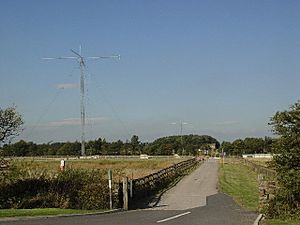HMS Forest Moor facts for kids
class="infobox " style="float: right; clear: right; width: 315px; border-spacing: 2px; text-align: left; font-size: 90%;"
| colspan="2" style="text-align: center; font-size: 90%; line-height: 1.5em;" | 
|}
HMS Forest Moor was a special land base for the Royal Navy in England. It was located in a beautiful area called Nidderdale in North Yorkshire. Even though it was called "HMS Forest Moor," it wasn't a ship that sailed on water. Instead, it was a base on land, often called a "stone frigate" by the Navy.
Contents
| History | |
|---|---|
| Name | HMS Forest Moor |
| Commissioned | October 1960 |
| Decommissioned | November 2003 |
| General characteristics | |
| Class and type | Stone frigate |
| Notes | 40 acres (16 ha) |
What Was HMS Forest Moor?
HMS Forest Moor was a very important place for sending and receiving secret messages. It covered about 40 acres of land. This base helped the Royal Navy talk to its ships and other bases around the world.
Early Days and World War II
The site where HMS Forest Moor was built had a secret past. During the Second World War, it was used as one of the "Y-stations." These were special places where people listened in on enemy radio messages. They helped gather important information for the war effort.
A Hub for Communications
In 1960, HMS Forest Moor became the main place for the Royal Navy to receive high frequency (HF) radio signals. Think of HF signals as long-distance radio waves. The base's main job was to get these signals from places far away. Then, it would send them to military bases and command centers in the United Kingdom.
A small team of Royal Navy radio operators and electricians worked at the base. There were usually about six people per shift. They made sure all the communication links worked perfectly.
Connecting the World
This center helped connect the UK with bases in the Indian Ocean, the Mediterranean Sea, and Canada. It also had a special link to talk to warships out at sea. This link was called a RATT ship/shore receiver link. It allowed ships to send and receive messages from land. The signals that were sent out from the UK came from another base called HMS Inskip in Lancashire.
Life at the Base
Even though it was a communication center, HMS Forest Moor also had a small team to help run the base every day. This included people like a Royal Navy police officer (RPO), a catering officer, and chefs. They made sure everyone was fed and the base ran smoothly. There were also three civilian drivers who helped with transport.
HMS Forest Moor on TV
Believe it or not, HMS Forest Moor was even featured on TV! It was the setting for a short comedy show called Thundercloud. The show was made by YTV. It was about a "stone frigate" that the Royal Navy mistakenly thought was a real ship.
Changes Over Time
In 2003, HMS Forest Moor changed hands. It was given to a company called VT Communications, which is now part of Babcock International. This happened under a special agreement called a public-private partnership (PPP). This meant a private company would help the government provide important services.
Under this new agreement, the company continued to provide HF communications for the Ministry of Defence. Now, civilian staff operate the communications from a new site. This new site is about 190-acre (78 ha) big and is next to the old Forest Moor base.
What Happened Next?
In 2010, the old HMS Forest Moor site was sold. Defence Estates, which manages military land, sold it to North Yorkshire County Council for £4.7 million. The site has since been changed into a school. This school helps children who have difficulties with their behavior, emotions, and social skills.
 | Jewel Prestage |
 | Ella Baker |
 | Fannie Lou Hamer |

